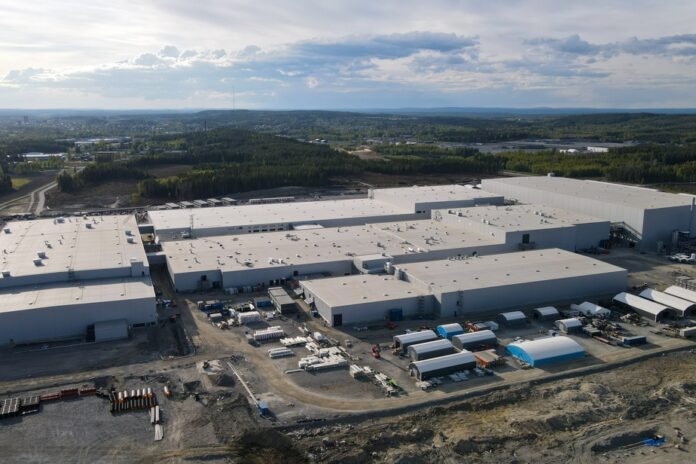A few weeks away from announcing what will be the largest private industrial project in Quebec, the battery cell manufacturer Northvolt is preparing the ground by collecting 1.6 billion (1.2 billion US). Several Canadian pension plans participate in the financing, but not the Caisse de depot et placement du Québec (CDPQ).
Northvolt has found 1.6 billion for its future Quebec factory on the South Shore of Montreal.
When announced, it will be the largest private industrial project in the history of Quebec.
This is an investment of 7 billion resulting in the creation of 4000 jobs.
The mega-factory will cover an area equivalent to 75 football pitches.
According to our information, the construction of this huge complex should lead to the creation of some 4,000 jobs and should represent an investment of around 7 billion – a sum also advanced by the Bloomberg agency. In a sign that we are approaching a formal announcement, Northvolt confirms that its most recent round of financing will be used to finance its North American expansion.
“This strengthens our position to meet the massive demand for sustainable battery solutions, both in Europe and North America,” says co-founder and CEO of the Swedish company, Peter Carlsson.
According to the Financial Times, the Swedish start-up is preparing to raise more than 5 billion over the next few weeks and is also considering an IPO next year to fund its ambitions on both sides of the Atlantic.
La Presse has already revealed that it is on the land on which the Canadian Industries Limited (CIL) explosives factory once stood, on the border of McMasterville and Saint-Basile-le-Grand, on the Rive -South of Montreal, that the company, which already counts BMW, Volvo and Volkswagen among its customers, wishes to establish itself.
The proximity of a high-voltage line, which would facilitate connection to the Hydro-Québec network, access to a large labor pool and the presence of a railway in the area are elements that work in favor of the place.
As for the announcement, the event should take place by the beginning of October, according to our information. The details of the financial package are still unknown, but the money obtained by Northvolt on Tuesday represents around 23% of the total for the projected plant in the southern suburbs of the metropolis. Quebec and Ottawa will certainly put their shoulder to the wheel, as has been the case for most major announcements concerning the sector of batteries for electric vehicles.
In Bécancour, the two orders of government will advance half of the amount necessary for the construction of the Ford plant intended for the production of battery materials (cathodes). In Ontario, Volkswagen will receive more than $13 billion in subsidies for its battery assembly site, estimated at $20 billion.
In the battery industry, cell manufacturing is the last step before assembling a lithium-ion battery found in electric vehicles. This is the missing link in the ecosystem that the Legault government wants to put in place.
A lithium-ion battery found in a car is in a way an assembly of individual battery units, the cells. They are connected in series by an electronic circuit. The number and size of each cell determines the amount of electricity an electric vehicle battery is able to store.
A memo prepared in February for the attention of the Federal Minister of Finance, Chrystia Freeland, which La Presse had been able to consult, specified the Quebec ambitions of Northvolt. After reaching production cruising speed, the plant would have a capacity of 60 gigawatt hours, enough to power 1 million electric vehicles annually.
This complex would extend over an area equivalent to 100 hectares, or more than 75 football fields. This footprint is similar to that of the Northvolt-operated plant in Sweden, where deliveries began last year.
In order to raise 1.6 billion more, the Swedish company convinced well-established institutional investors. The American giant BlackRock is part of the adventure. Among the Canadian players are RPC Investments, the Investment Management Corporation of Ontario and the Ontario Municipal Employees Retirement System (OMERS) – already a shareholder of Northvolt.
Asked if it was interested in this round of financing, the CDPQ did not comment. The woolen stocking of Quebecers has already expressed its interest in the battery sector, but it has not yet made a significant investment. The Quebec institution is less used to financing companies that embark on the construction of projects on virgin sites (greenfield).
The Quebec pension plan manager was among the entities targeted by the Swedish company as part of its lobbying activities in Quebec in recent months. It remains to be seen whether an agreement will eventually succeed between the two parties.
Northvolt is not the only battery cell manufacturer interested in Quebec. According to Carrefour Lobby Quebec, the French joint venture Automotive Cells Company (ACC), which counts TotalEnergies, Stellantis and Mercedes-Benz among its shareholders, has also tested the waters with Mirabel, in the Laurentians, and Investissement Quebec, the financial arm of the Quebec state.
“[Obtaining] direct funding, incentives and grants related to the site selection, development and construction of a new battery processing plant in the province of Quebec,” VAC’s brief read, without provide more details.
Economy, Innovation and Energy Minister Pierre Fitzgibbon has previously hinted that it would be difficult to welcome more than a large battery cell manufacturer to the province, as it is These are energy-intensive projects and the blocks of electricity available are limited.
Quebec has already indicated that it wants to reserve 900 megawatts of electricity for the battery sector.
Year of foundation: 2015
Headquarters: Stockholm
Products: battery materials, energy storage systems and charging infrastructure
Workforce: more than 4000 people
Customers and partners: Volkswagen, BMW, Volvo, Polestar, Scania















